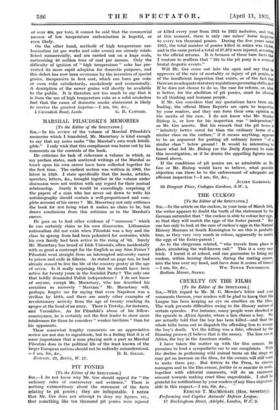MARSHAL PILSUDSKI'S MEMORIES [To the Editor of the SPECTATOR.]
Sin,—In his review of the volume of Marshal Pilsudski's memories which I translated, Mr. Macartney is kind enough to say that my notes make "the Marshal's own work intelli- gible." I only wish that this compliment was borne out by his comments on the contents of the book.
He criticizes for lack of coherence a volume in which, as my preface states, such scattered writings of the Marshal as touch upon his own career have been collected together for the first time. The earliest section was written in 1903, the latest in 1929. I state specifically that the books, articles, speeches, letters, &c., brought together in the volume under discussion were not written with any regard for their mutual _relationship. Surely it would be exceedingly surprising if the papers of a man who has never sat down to write his autobiography should contain a well-proportioned and corn- .plete account of his career ? Mr. Macartney not only criticizes the book for not being what it makes no claim to be, but draws conclusions from this criticism as to the Marshal's career.
He goes on to find other evidence of " unreason " which he can certainly claim as his own discoveries. Lithuanian nationalism did not exist when Pilsudski was a boy and the class he sprang from had been polonized for centuries, while his own family had been active in the rising of '63. Surely Mr. Macartney has heard of Irish Unionists, often incidentally with as great a contempt for the English as any Sinn Feiner ? Pilsudski went straight from an interrupted university career to prison and exile in Siberia. As stated on page ten, he had already ceased to live the life of the country gentry at the age of seven. Is it really surprising that he should have been active for twenty years in the Socialist Party ? The only one that boldly demanded Polish independence ? I do not know of anyone, except Mr. Macartney, who has described his socialism as narrowly " Marxism." Mr. Macartney will, perhaps, forgive me for saying that even Napoleon was a civilian by birth, and there are surely other examples of revolutionary activity from the age of twenty reaching its apogee at the head of an army. There is Trotsky, for instance, and Voroshilov. As for PiLsudski's abuse of his fellow- countrymen, he is certainly not the first leader to show more intolerance for those he considers " weaker brethren " than for his opponents.
These somewhat lengthy comments on an appreciative review are not due to ingratitude, but to a feeling that it is of some importance that a man playing such a part as Marshal Pilsudski does in the political life of the least known of the larger European nations should not be radically misunderstood.










































 Previous page
Previous page